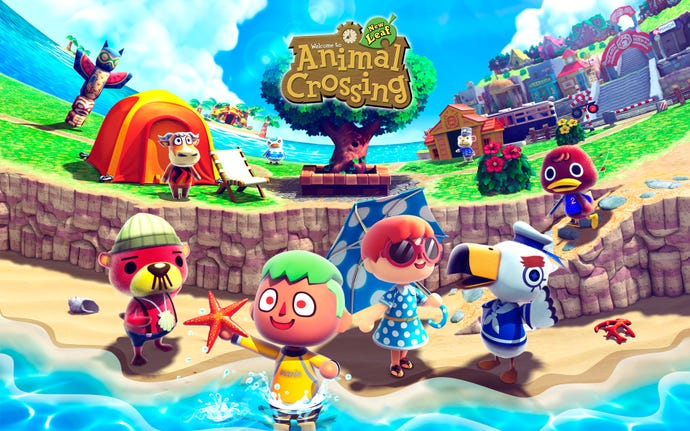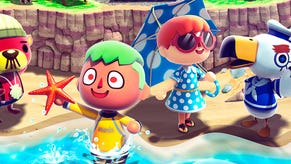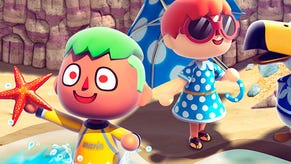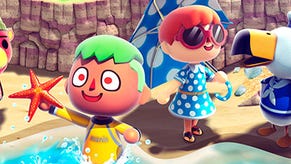Why Play Animal Crossing, Anyway? (A Primer)
Curious what the big deal is about Nintendo's quirky attempt at the simulation genre?
This article first appeared on USgamer, a partner publication of VG247. Some content, such as this article, has been migrated to VG247 for posterity after USgamer's closure - but it has not been edited or further vetted by the VG247 team.
We gamer types tend to look down our nose at anything that doesn't quite fall into the well-defined boundaries of our preferred genres and game types, and yet Animal Crossing commands a thriving fan base within the ranks of the much-touted "core gamer" demographic. This, despite its utter lack of conflict, violence, or concrete purpose. Despite its so-cute-you'll-barf graphics. Despite the fact that character customization revolves around fashion choices rather than statistics or skill trees.
Animal Crossing demands nothing more of players than a few minutes' daily play and some savvy financial planning. Your objectives consist of paying off a house loan, collecting the neatest knickknacks, and dressing your character up in the finest style. It sounds absolutely childish, and the cutesy graphical style doesn't do much to discourage that perception. And yet, somehow, a goodly number of Animal Crossing fanatics are adults -- people who not only don't seem to link up as the game's "proper" audience, but people who already deal with the game's menial tasks in their day-to-day lives. So why on earth would someone sweating out a mortgage in the real world want to spend their free time doing the exact same thing?
The answer: While Animal Crossing may not look like the typical core-oriented video game, it tickles the same primal pleasure zones as its more "serious" cousins. While it lacks a single ultimate goal, it offers plenty of minor objectives for players to pursue at their discretion. Besides upgrading your house to its maximum size, you also can compete for a high score with your interior decorating skills. (This is more challenging than you might expect, demanding you make canny use of matching item sets, appropriate decor for the month, and the principles of feng shui while still trying to express your own tastes.) You can race to deck out the local museum with a sample of every kind of bug, fish, fossil, and classic artwork to exist in Animal Crossing's world, tasks held up by seasonal specificity, rarity, and the fact that most of the artwork you'll acquire (one piece per week) turns out to be fake.

As multiplayer has sunk its hooks ever deeper into Animal Crossing's design, an MMO-like loot/bragging rights vibe has grown more prominent in the game's design as well. You have no less than three different ways to show off your town to others in New Leaf -- invite them in for an actual visit, trade your house design via Street Pass, and share an ethereal vision of your home online through the Dream Suite -- and the towns in question allow for a remarkable amount of customization. Besides the long-standing option of planting trees and flowers, you can also install public works like campsites and benches, put up photo booths, decorate the ground with pattern tiles, and more.
Even if you settle on simply building up your house as a goal, much of the appeal of Animal Crossing comes from the varied ways in which you can go about this. At the beginning, your only real sources of earning cash are selling loose fruit and seashells for a pittance, but in time you gain the tools and means to become very efficient at piling up loot. You can replace unproductive trees with "perfect" versions of your local crop or valuable foreign fruit collected from other people's villages. You can capture bugs and fish; once the tropical island opens up, this becomes an insanely efficient way of racking up huge money (assuming you have the patience to capture rare beetles and sharks). For the truly serious player, though, tremendous wealth can be had by investing in commodities (turnips), conferring with friends, and visiting someone else's town when the price of turnips spikes.
You don't have to be a Wall Street shark to make a living, though. Slow and steady also does the trick. Every day, new fossils appear to be dug up and a single rock inexplicably produces money when struck. By picking the money stone clean and selling off any fossils the museum doesn't need, you can easily net 20,000 bells per day or so for a 15-minute tour of town. It all really depends on how much you want to play each day, how married you are to the concept of a daily routine, and whether you see money as an end or simply a means.
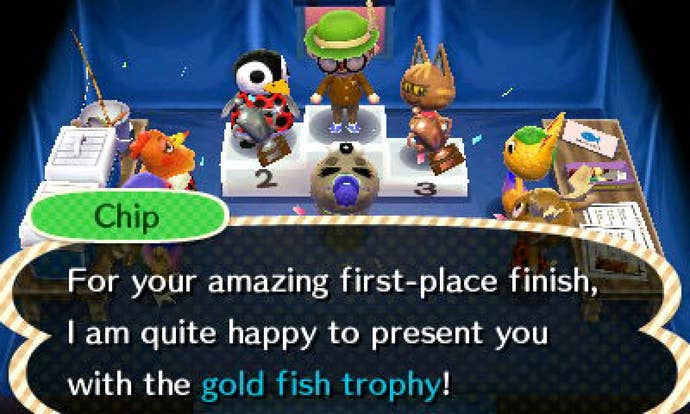
Like I said in my review, Animal Crossing feels in many ways like the proto-social game. It's a bit aimless, it involves showing off to your friends (or begging them for stuff), sometimes it can feel like busywork. What sets it apart from an ocean of callow Facebook games is that it holds on to a sort of Protestant work ethic; Animal Crossing doesn't let you advance with a few lazy mouse clicks but instead metes out progress as a reward for actual effort. You can choose to game the system, or not, but the milestones you accomplish seem commensurate with your investment, whether that boils down to time and persistence or simply some canny mental arithmetic to sort out the ideal strategy for raking in big bucks as much as possible.
Plus, if you play it right you can eventually cram your home full of Nintendo trinkets like Triforces and Metroid tubes. Try that in your Facebook games. (Well, you know. Legally.)
